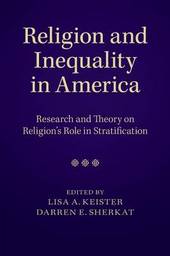
|
Religion and Inequality in America: Research and Theory on Religion's Role in Stratification
Paperback / softback
Main Details
| Title |
Religion and Inequality in America: Research and Theory on Religion's Role in Stratification
|
| Authors and Contributors |
Edited by Lisa A. Keister
|
|
Edited by Darren E. Sherkat
|
| Physical Properties |
| Format:Paperback / softback | | Pages:380 | | Dimensions(mm): Height 229,Width 152 |
|
| ISBN/Barcode |
9781107657113
|
| Classifications | Dewey:305.0973 |
|---|
| Audience | | Professional & Vocational | | Tertiary Education (US: College) | |
|---|
| Illustrations |
41 Tables, unspecified; 53 Line drawings, unspecified
|
|
Publishing Details |
| Publisher |
Cambridge University Press
|
| Imprint |
Cambridge University Press
|
| Publication Date |
10 July 2014 |
| Publication Country |
United Kingdom
|
Description
Despite the growing quantity and quality of research connecting religion to inequality, no single volume to date brings together key figures to discuss various components of this process. This volume aims to fill this gap with contributions from top scholars in the fields of religion and sociology. The essays in this volume provide important new details about how and why religion and inequality are related by focusing on new indicators of inequality and well-being, combining and studying mediating factors in new and informative ways, focusing on critical and often understudied groups, and exploring the changing relationship between religion and inequality over time.
Author Biography
Lisa Keister is Gilhuly Family Distinguished Professor of Sociology at Duke University. She conducts research on wealth inequality, asset accumulation, and the causes of each. She is author of several books, including Faith and Money (2011), Getting Rich: America's New Rich and How They Got There (2005), and Wealth in America (2000). She also does work on Chinese corporations and the country's economic transition. Her research on China includes the book Chinese Business Groups (2000) and various articles. Darren Sherkat is Professor of Sociology at Southern Illinois University, Carbondale. His research examines the demography of American religion and the impact of religion on family, stratification, and politics in the United States. He has published more than fifty peer-reviewed articles, and his book, Religious Identification in America, is forthcoming.
Reviews'Keister and Sherkat's Religion and Inequality in America reviews past research with clarity, offers new analyses and insights, and sets an ambitious agenda for future work. This is a must-read for anyone interested in religion and social stratification.' Roger Finke, Pennsylvania State University 'This important new volume on religion and inequality is impressive in the quality of the individual chapters and in the range of topics covered. It is a comprehensive guide to the best new research on how religion shapes both well-being and attainment, drawing primarily on quantitative analyses of large-scale, nationally representative data sets. Scholars and students across a range of social science disciplines will find this indispensable.' Penny Edgell, University of Minnesota 'A groundbreaking contribution to the joint consideration of two of the most prominent features of any society: religion and social stratification. Religion and Inequality in America is a compilation of excellent chapters dealing with original and provocative topics around this theme and is well grounded in a broad literature that stretches back through the history of sociology.' Duane F. Alwin, McCourtney Professor of Sociology and Demography, Pennsylvania State University 'Religion and Inequality in America stands out from so many others in the depth, rigor, and quality of its contributions. The authors are able to maintain this high standard even while addressing an unusually wide range of cutting-edge issues in the field, greatly expanding our knowledge of processes related to life course, family, ethnicity, and health that explain the relationship between religion and stratification. Each chapter not only provides solid and trustworthy research findings but is also strengthened by active and creative engagement of the theoretical issues at stake. This will be the most cited volume on religion and inequality in two decades - and deservedly so.' David Sikkink, University of Notre Dame
|